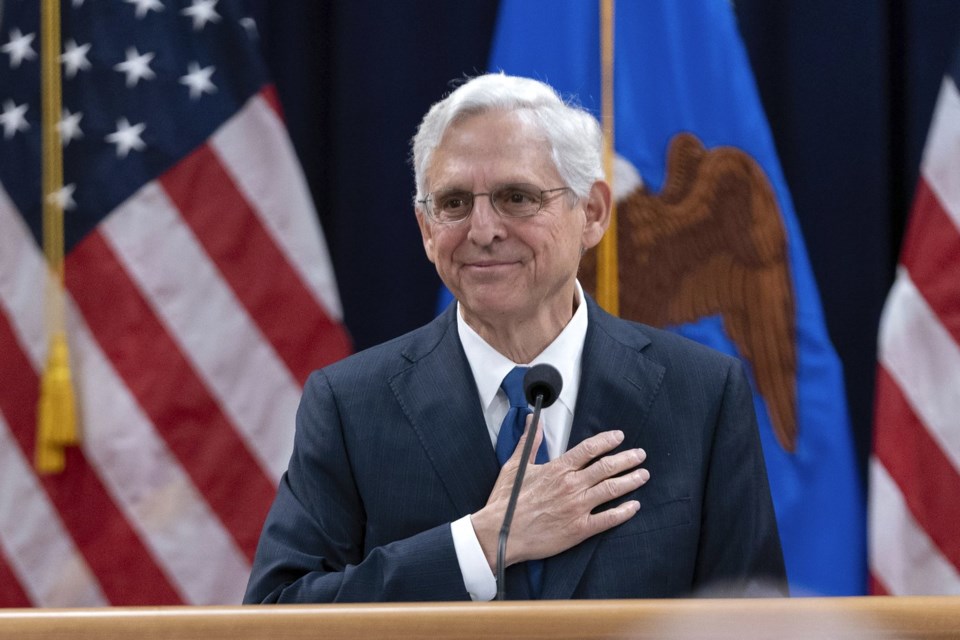WASHINGTON (AP) — Attorney General Merrick Garland said Thursday he will not allow the Justice Department “to be used as a political weapon," as he denounced "conspiracy theories and “dangerous falsehoods" targeting federal law enforcement.
Speaking to U.S. attorneys gathered in Washington and other Justice Department members, Garland forcefully defended the department’s integrity and impartiality against claims of politicization by Republicans. Garland said norms protecting the department from political interference matter “now more than ever.”
“Our norms are a promise that we will not allow this Department to be used as a political weapon. And our norms are a promise that we will not allow this nation to become a country where law enforcement is treated as an apparatus of politics," Garland said to applause in in the Great Hall at Justice Department headquarters.
Garland's comments come amid an onslaught of attacks from Republicans, who claim the Justice Department has been politically weaponized to go after former President Donald Trump. Trump was indicted in two separate criminal cases by special counsel Jack Smith, whom Garland brought in from outside the department to run the investigations.
In response to Garland's speech, Trump campaign spokesperson Steven Cheung called the criminal charges against the former president “phony," and said Garland has done “tremendous damage to a once great institution."
Trump has vowed if returned to the White House in November to “completely overhaul" what he has described as the “corrupt Department of Injustice.” He has also threatened to jail those “involved in unscrupulous behavior” this election, writing in a recent post on X that they will face ”long term prison sentences so that this Depravity of Justice does not happen again."
Garland did not mention Trump or Republicans or discuss specific cases in his speech. But he condemned what he described as “outrageous” attacks he said put law enforcement in harm’s way.
“These attacks have come in the form of conspiracy theories, dangerous falsehoods, efforts to bully and intimidate career public servants by repeatedly and publicly singling them out, and threats of actual violence,” Garland said. “Through your continued work, you have made clear that the Justice Department will not be intimidated by these attacks."
Trump, the Republican presidential nominee, has repeatedly used social media to go after Smith and other prosecutors as well as the judges handling his cases. Republicans have also falsely claimed that New York criminal case, in which Trump was convicted of 34 felony counts in May, was orchestrated by Biden and the Justice Department.
Garland came into office pledging to restore the department’s reputation for political independence after four tumultuous years under Trump. But he has faced an criticism over his department’s handling of politically sensitive cases, including the prosecution of Democratic President Joe Biden’s son Hunter, who pleaded guilty last week to federal tax charges in a case brought by a different special counsel.
Garland said that department employees have made clear through their work that they “do not bend to politics" and that they “will not break under pressure.”
“There is not one rule for friends and another for foes, one rule for the powerful and another for the powerless, one rule for the rich and another for the poor, one rule for Democrats and another for Republicans, or different rules depending on one’s race or ethnicity," Garland said. “To the contrary, we have only one rule: We follow the facts and apply the law in a way that respects the Constitution and protects civil liberties.”
Neither of the federal cases brought against Trump will go to trial before the election. A judge in Florida dismissed the case accusing Trump of illegally hoarding classified documents at his Mar-a-Lago estate and obstructing government efforts to get them back. The special counsel is appealing that ruling.
The other federal case accusing Trump of conspiring to overturn his 2020 election loss was recently returned to the trial court after the Supreme Court ruled that former presidents are entitled to broad immunity from criminal charges. The case is expected to be tied up for months, if not longer, with arguing and likely more appeals over which allegations can proceed to trial.
Alanna Durkin Richer, The Associated Press



